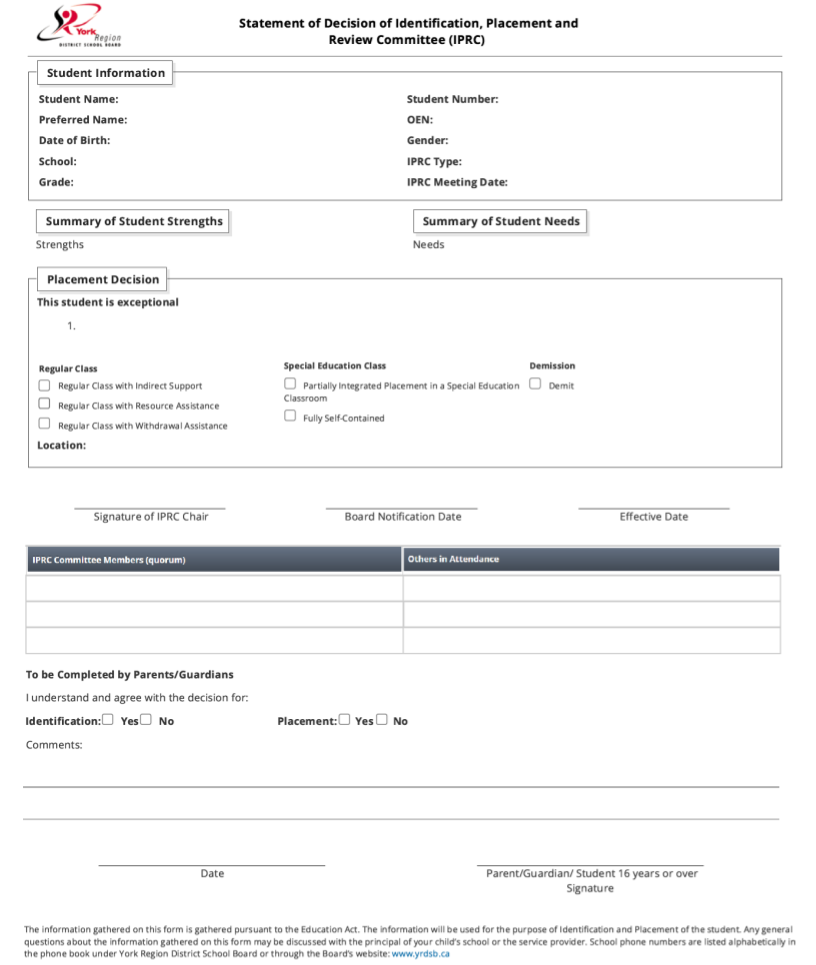The IPRC Process
An IPRC is a formal committee that meets and decides if a student should be identified as exceptional. If so, the committee will determine the placement that will best meet the needs of the student. All school boards must establish one or more IPRCs. An IPRC is composed of at least three persons, one of whom must be a principal or supervisory officer of the board. A school board trustee may not be a member of an IPRC. (See Ontario Regulation 181/98, sections 10 and 11).
Ontario Regulation 181/98 requires that all school boards establish Identification, Placement and Review Committees (IPRC). The York Region District School Board's Procedure #NP360.0, Special Education: Identification, Placement and Review Committee complies with this regulation and outlines the procedures for an IPRC.
The Role of an IPRC is to:
-
decide whether or not the student is exceptional; and
-
decide on an appropriate placement for the student;
-
describe the student's strengths and needs;
-
identify the area(s) of the student's exceptionality according to the categories and definitions provided by the Ministry of Education;
-
discuss proposals and recommendations for programs and services if the parent/guardian or the student age 16 or older requests it; and
-
review the identification and placement at least once in a school year.
Requesting an IPRC Meeting
When an IPRC meeting is requested in writing by a parent/guardian, the Principal within 15 days will:
- acknowledge in writing, the request and indicate that an IPRC will be held within a reasonable time period; and,
- provide the parents/guardians with a copy of the Parent/Guardian's Guide to the Identification, Placement and Review Committee including SEAC information.
Notice of the IPRC Meeting
-
The Principal provides parents/guardians with a copy of the following documents at least 10 days prior to the IPRC:
-
Letter of Invitation
-
Preparation for the IPRC Meeting
For all requests for an IPRC, the Principal:
- ensures that data collected during the referral process has been discussed and shared with the parents/guardians, including:
- In-School Team Record;
- educational assessments;
- other assessments (as required);
- ensures that parents/guardians have had an opportunity to discuss:
- recommendations to be considered by the IPRC for identification and placement; and,
- the IPRC process.
Attending the IPRC Meeting
Although parents/guardians and students 16 years of age or older are not part of the IPRC quorum, they are entitled to be present and participate in all committee discussions about the student. Students younger than 16, if appropriate, and with the permission of the parent/guardian; may also attend the meeting.
In addition to the three people that constitute an IPRC, other people may attend the IPRC meeting. Possible attendees include:
- The principal of the student’s school (if not already a member of the IPRC);
- resource people such as the student's teacher, special education staff, support staff;
- a representative of the parent or student (i.e. representatives from relevant agencies or advocates);
- an interpreter, if necessary; and/or,
- other individuals as requested either by the parent or the Principal of the student's school.
The IPRC Procedure Summary Chart (PDF) outlines the individuals required to attend the IPRC meeting in order to meet the legal requirements of three individuals part of the IPRC quorum and one that must be a Principal or Superintendent. Specific paperwork, such as the Statement of Decision, is required in the Student Services Network (SSNET).
Recording at an IPRC Meeting Through the Statement of Decision
The Statement of Decision outlines the Student Information, Student Strengths and Needs, the Placement Decision and Identification, Signature of IPRC Chair, a list of IPRC Committee Members and Others in Attendance, Special Transportation Request, and Parent/Guardian/Student over 16 years of age Signature.
The chair of the IPRC must send a copy of the Statement of Decision to:
- The parents/guardians;
- The student, if 16 years of age or older;
- The school principal;
- The director of the school board.
In YRDSB, this process is completed through SSNET. The original signed Statement of Decision is placed in the student’s OSR.
The IPRC Placement Decision
The IPRC considers first whether placement in a regular class in the home school with appropriate support will meet the student’s needs and is consistent with the parent/guardian’s preference. For students whose needs are anticipated to be met in a Community Class, the Principal must arrange the IPRC in consultation with the CEC Student Services Coordinator. In these cases, the Coordinator is a member of the IPRC committee. Once the IPRC has identified the student as exceptional and the parents/guardians have agreed with the IPRC identification and placement decision, within 30 school days of placement being implemented, school staff develop an Individual Education Plan (IEP) for the student and a copy is shared with parents/guardians.

Disagreement with the IPRC Decision
If the parents disagree with the decision, they may:
- ask to meet with the IPRC (original committee) again within 15 days for further discussion; or,
- file a notice of appeal with the Secretary of the Board Director, within thirty days of receipt of the initial IPRC decision.
If parents/guardians choose to engage in further discussion, the purpose of this follow-up meeting is to review the decisions made by the IPRC in light of parent/guardian concerns, with the original members of the committee. The meeting will be held as soon as possible after the request has been received. At this meeting, parents/guardians will be able to explain concerns to the committee. The committee will listen and try to resolve concerns. The IPRC will decide whether to change its decision(s) or not while parents/guardians are present. If parents/guardians remain dissatisfied, they may appeal the decision(s) of the IPRC within fifteen days of the receipt of the decision of the second meeting.
The IPRC Review Meeting
The identification and placement decision of each student identified as exceptional and placed in a special education program is reviewed at least once each school year. A Review IPRC can be requested after the placement has been in effect for three months. A request for a review cannot be made more often than once in a three-month period.
Annually, schools will send home The Confirmation of Continued IPRC Identification and Placement form, which outlines the Student Information, as well as the continuation of the student's current Identification and Placement. If the parent/guardian wishes to discuss or change the identification or placement decision, they must indicate it on the form and return it to the school.
If parents/guardians request a Review IPRC meeting, the student’s Individual Education Plan (IEP) and progress reports will be considered. Any new assessment reports provided by the school or the parents will also be considered. The IPRC review decision may confirm the identification or placement or may change either or both.
The IPRC Appeal
How to Appeal an IPRC Decision:
If parent/guardian or student (16 or older) disagree with the IPRC decision(s), one can:
- file a written notice of appeal to the Director/Secretary of the York Region District
School Board, 60 Wellington St. W., Aurora, ON, L4G 3H2 within 30 days of the original receipt of the IPRC’s decisions; or
- file a written notice of appeal to the address above within 15 days of receiving the second IPRC meeting decision to the Director/Secretary of the Board. In the letter of appeal, parents/guardians must state which of the IPRC decisions are being appealed and the reasons for disagreeing with the committee.
Member of the IPRC Appeal Board:
A Special Education Appeal Board consists of three members, none of whom has had any prior involvement with the matter under appeal. The committee has:
- one member selected by the York Region District School Board;
- one member selected by the parents/guardians; and
- a Chair selected jointly by the other two members, or the appropriate district manager of the Ministry of Education, if the two members are unable to agree on the Chair.
Function of the IPRC Appeal Board:
The Chair of the Appeal Board will arrange a meeting of the Appeal Board within 30 days of being selected. At this meeting, the Appeal Board will receive and review the material reviewed by the IPRC and may interview anyone who may contribute information about the matter. Parents/guardians and their child (over the age of 16) will be invited to attend and participate in all discussions.
Within three days of the meeting ending, the Appeal Board will make its recommendation(s). It may:
- agree with the IPRC and recommend that the decision be implemented; or
- disagree with the IPRC and make a recommendation to the Board about the child’s identification, placement or both. The Appeal Board will report its recommendations and reasons, in writing, to the parents/guardians and to the School Board.
Implementing the Board’s Recommendations:
- The School Board will decide what action to take with respect to the recommendations, within 30 days of receiving the Appeal Board’s written statement. (Please note: school boards are not required to follow the Appeal Board recommendation);
- Parents/Guardians can accept the School Board’s decision or appeal to a Special Education Tribunal by writing to the tribunal’s secretary. Information about applying to the tribunal will be included with the Appeal Board’s decision.
Number of IPRC referrals, reviews, and appeals conducted within the Board in the previous school year: 22017
Number of IPRC referrals as captured in Statements of Decision: 10618
Number of IPRC reviews as captured in Confirmation of Continuation of Placement: 11399
Number of IPRC Appeals: 0

